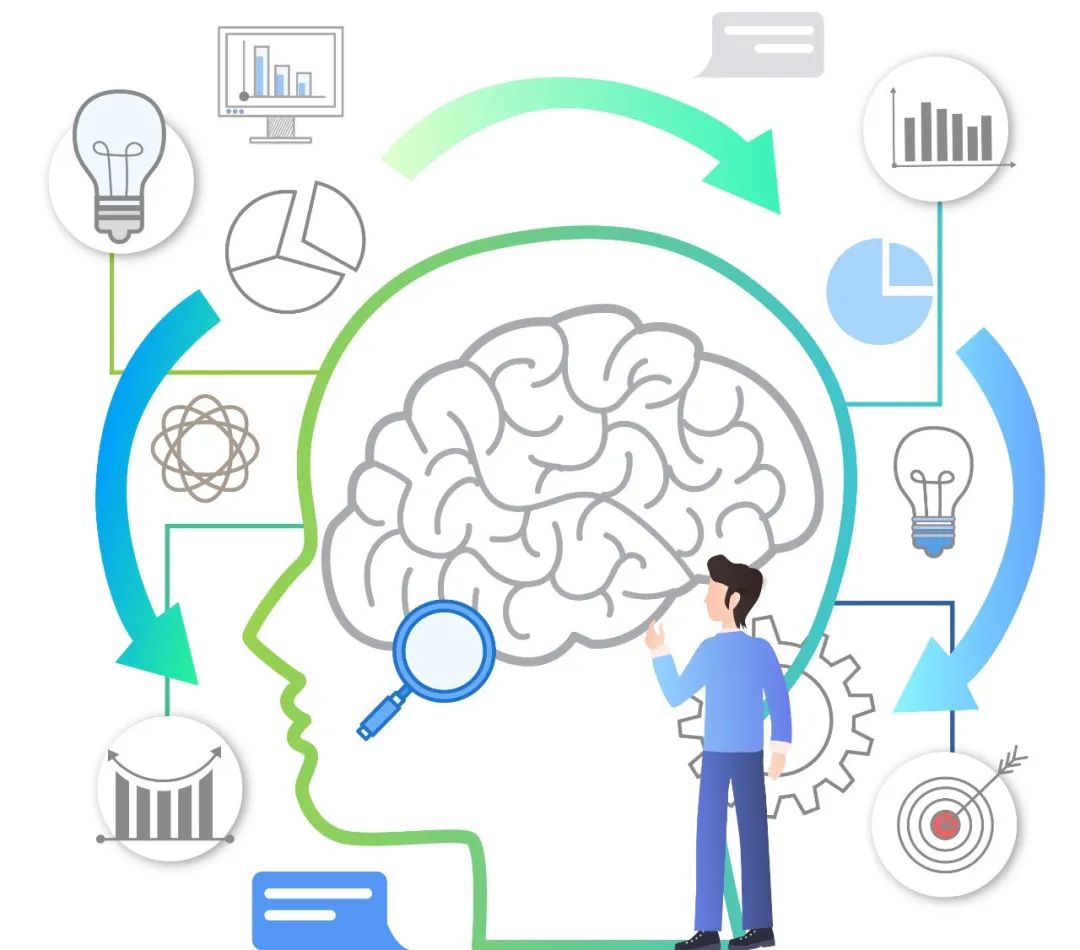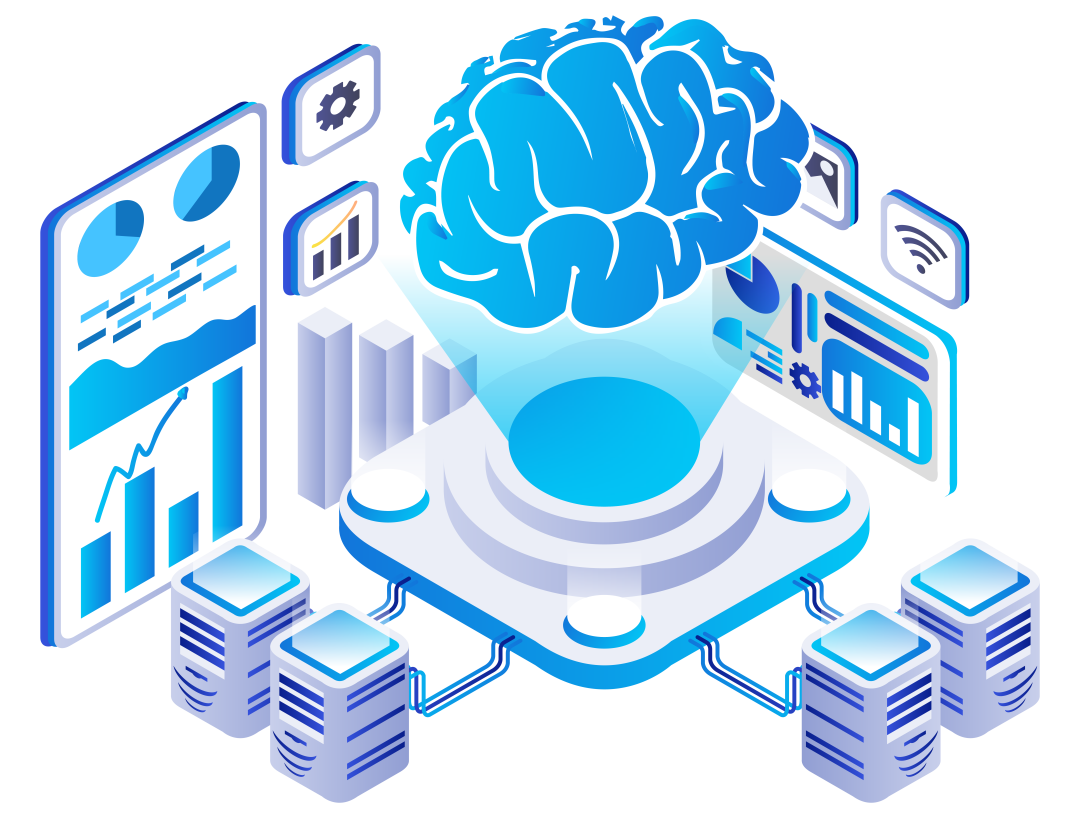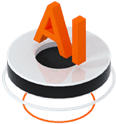Released by Alibaba Cloud Research Center
The essence of the industrial Internet is that advanced information technologies are applied and practiced in the manufacturing field. These technologies include cloud computing, big data, artificial intelligence, the Internet, and connection technology represented by 5G. The application of the technologies will break down the physical boundaries of factories, expand to the supply chain and the entire industry, and finally form an industrial brain. It will bring about innovation and breakthroughs to the industrial Internet.
The industrial brain is based on the future factory. Only when a factory is fully digitized and intelligent can it gradually extend outward, connect more resources, and realize more innovation.

In practice, Alibaba Cloud has summarized the process of realizing the industrial brain into four steps: intelligent devices, end-to-end intelligent manufacturing process, intelligent business decision-making, and intelligent collaboration of the entire industry chain.
The application of digital technology to industries can be divided into four levels: perception, cognition, decision-making, and coordination or control.
First of all, devices in factories can be perceived, which is an essential foundation of the Internet of Things. On the one hand, ordinary production devices can be fully digitized through the module components of Artificial Intelligence of Things (AIoT). On the other hand, due to the strict requirement for timeliness in factories, complete edge computing solutions are also needed to meet the requirement.
The second level is cognition. Alibaba Cloud has established knowledge graphs for most relatively complex industries. For example, the State Grid has hundreds of thousands of kinds of devices. When a device breaks down, how can they diagnose the issue and repair it quickly? In the past, they relied on the skills of engineers. Now, the experience of seasoned engineers is converted into knowledge graphs, making it more convenient to diagnose faults and maintain devices.
Similarly, automobile production is also a complex project. An automobile has nearly 20,000 spare parts, but the number of spare parts in a production line is even more staggering. Spare parts management is required to maintain devices in the production line. In the past, due to the unpredictability of faults in a production line, a factory had to prepare a large number of spare parts. However, thanks to knowledge graphs, the solution can systematize experience and knowledge and guide maintenance engineers to diagnose and repair faults quickly. In addition, the knowledge graph can help digitize device conditions, maintenance cycle, and the required number of spare parts and deeply optimize the management of spare parts.
The third level is decision-making. In some manufacturing enterprises, the production process is very complicated. A large amount of data collected in the process needs to be used as a reference for decision-making to exert its value.
For example, Chongqing Sanfeng Environment Group is an enterprise specializing in waste incineration. They need to integrate and optimize a large number of parameters of incinerators to realize energy optimization. In the past, the enterprise made decisions using an automatic control system that was dependent more on personal experience. Nowadays, it uses the industrial Internet platform to collect data and applies the artificial intelligence algorithm and visual analysis algorithm of the industrial brain to realize intelligent decision-making. The final goal is to achieve coordination or control.

Finally, data collection, perception, cognition, decision-making, and control constitute a complete process. Autonomy for Industrial Control Systems (AICS) plays an important role, allowing digital technology and industry to achieve deep integration. In addition to the enterprise mentioned above, this complete set of the industrial integration process is widely used in the production lines of EFORT and ZC Rubber.
With intelligent devices, the elements of the process can be analyzed and deduced, and the end-to-end intelligent manufacturing process can be realized on a new platform.
Alibaba Cloud participated in the construction of smart factory 2.0 of Conch Cement Co., Ltd. This is an important step for Conch Cement to move towards automatic control, digitalization, and intelligence. Also, it is an important case for traditional industries realizing digital factories. There are three innovations in this collaboration: global control, automatic optimization, and cloud-edge collaboration.
First of all, Alibaba Cloud finds that a lot of aspects can be optimized, such as energy consumption, processing parameters, and manufacturing steps, by collecting a large amount of data generated in the production and manufacturing process of Conch Cement, including conventional steps such as production milling, calcination in rotary kilns, and cement milling. Then, Alibaba Cloud digitizes all the objects required to be optimized and makes the entire process a digital twin. In the digital twin system, the knowledge and experience of experts are used as optimized and recommended parameters to be fed into the system to simulate the optimized effect.
Last but not least, automatic optimization can be carried out based on the system, and parameters can keep learning and realize optimization automatically in the production process. However, it was difficult to achieve this end-to-end intelligent upgrade by relying solely on automatic control systems.
The next step in the end-to-end intelligent manufacturing process is to be fully integrated with supply chain data and industrial management data to form a data middle platform that gathers global business and then realize intelligent business decision-making.
For example, in SANY Heavy Industry, Alibaba Cloud works with ROOTCLOUD to collect, cleanse, and archive data related to systems, production devices, and operations and then apply the data. All 86 core systems of SANY Heavy Industry have been put into a data middle platform, which can collect petabytes of data every year. This is a case in which the system construction in the traditional manufacturing industry has been implemented thoroughly.
The CIO from SANY Heavy Industry said, “In the long run, the next step for all companies is to be software companies.”
How can we understand his words? What does he mean?
In the past, production and manufacturing were all built around a certain device. The production process connected devices in series, and the optimization was mainly around those devices.
Today, the main part of optimization in many factories is overall efficiency, and what needs to be optimized is the overall process. From receiving orders to customer delivery, all nodes are the objects to be optimized. It is also the only way for the manufacturing industry to upgrade to provide products as services. Moreover, the upgrade of intelligent manufacturing is a comprehensive optimization of devices, production process, maintenance, and employee management.
Chongqing Refine-Yumei is a customer of Alibaba Cloud Feiiplat Industrial Internet. In this enterprise, an automobile engine block is marked with a QR code when it comes out of a die-casting machine. This QR code is related to all parameters (including temperature, pressure, and other data) of the die-casting machine during the production process.

Workers only need to scan the QR code to enter all the information into the system during processing, including who made the work-piece, how many work-pieces were made, whether there are defective products, and work-piece efficiency. All the information can be seen clearly through the system. In addition, the collected data can be used to perform unified optimization of management, assessment, and training.
Therefore, a data middle platform is very important for all enterprises. It has become the necessary infrastructure for all enterprises to transform and upgrade in the future.
From intelligent devices to overall optimization of workshops to factory-level management improvement to management collaboration between the supply chain and industry chain, the final step to realizing the future factory is how to digitize the management between organizations completely. Building a collaborative intelligence of people-device-organization for the entire industry chain will be an important goal in the future.
The industrial Internet needs to re-build a large number of systems. Here is a core question. Who is the best one to build this system?
In the past, professional software service companies were often invited to solve the problem. However, we have realized that each employee with demands knows how to build a new system best. On the contrary, people who specialized in developing information systems do not have those professional capabilities.
Therefore, the low code development platform was created and gained popularity. Engineers and front-line workers can use very simple low code development tools to build a system meeting requirements for being informationized on their posts.
Many customers have used the low-code platform of Alibaba Cloud to build their information platform. For example, the principal of the Experimental Primary School affiliated with Hefei Normal University in Anhui Province used the low-code tools to build the school's intelligent collaboration system and more than 50 applications. On top of all that, we have seen such a trend in customers from manufacturing, retailing, governmental departments, and many other industries.
The industrial brain is essentially an optimization system of industrial resource allocation, supported by the industrial Internet, with data resources as key elements. The industrial brain comprehensively integrates the industrial chain, supply chain, capital chain, and innovation chain, combines enterprises and governmental departments, and connects the production end and consumption end using a new generation of information technology. Therefore, it can provide digital empowerment for the production and operations of enterprises, offer digital services to industrial ecological construction, and provide digital means for economic governance. In addition, the industrial brain makes efforts to promote the reform of quality, efficiency, and power to build a modern industrial system.
However, the most typical characteristic of the industrial Internet is being fragmented. Each factory has different characteristics, so a factory's deep participation is the key to the success of this system. When the factory has sufficient capabilities to be digital and intelligent, it can coordinate all relationships in the supply chain based on the factory.
Source: Apsara Business Strategy Review
Author: Zhang Jianfeng, President of Alibaba Cloud Intelligence & President of DAMO Academy
Editor: Zhao Ziqian, Director of Content Operations, Alibaba Cloud Research Center
Disclaimer: The views expressed herein are for reference only and don't necessarily represent the official views of Alibaba Cloud.

1,338 posts | 470 followers
FollowAlibaba Clouder - October 10, 2018
Alibaba Clouder - October 15, 2018
Alibaba Clouder - June 20, 2018
Alibaba Clouder - November 29, 2018
Alibaba Clouder - December 25, 2019
Alibaba Clouder - June 21, 2018

1,338 posts | 470 followers
Follow Big Data Consulting for Data Technology Solution
Big Data Consulting for Data Technology Solution
Alibaba Cloud provides big data consulting services to help enterprises leverage advanced data technology.
Learn More Apsara Stack
Apsara Stack
Apsara Stack is a full-stack cloud solution created by Alibaba Cloud for medium- and large-size enterprise-class customers.
Learn More AI Acceleration Solution
AI Acceleration Solution
Accelerate AI-driven business and AI model training and inference with Alibaba Cloud GPU technology
Learn More Offline Visual Intelligence Software Packages
Offline Visual Intelligence Software Packages
Offline SDKs for visual production, such as image segmentation, video segmentation, and character recognition, based on deep learning technologies developed by Alibaba Cloud.
Learn MoreMore Posts by Alibaba Cloud Community